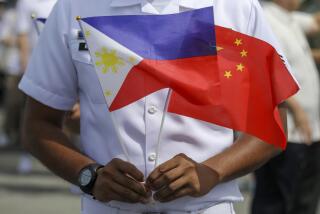U.N. Conference Adopts Fishing Treaty : Environment: Accord seeks to avert disputes, protect dwindling stocks. States to cooperate on enforcement.
- Share via
WASHINGTON — A U.N. conference on fisheries adopted a treaty Friday that authorizes inspectors of one country to board another country’s vessel on the high seas when they think its crew is taking more fish than allowed by international agreements.
When in force, according to its supporters, the accord will avert the kind of fishing war that erupted in March when Canadian ships fired shots across the bow of a Spanish trawler, chased it, then seized it--all in international waters. Warships from both sides soon steamed to the area and menaced each other. The new treaty sets down an orderly procedure for boarding a suspicious trawler and obliges both sides to submit any dispute to arbitration.
The treaty was not put to a vote but was approved by what the United Nations called “consensus.” After three years of negotiations, the conference chairman, Ambassador Satya N. Nandan of Fiji, announced that he understood the latest draft to be acceptable to all. No one rose to disagree, and the treaty was declared adopted. It will become international law 30 days after it is ratified by 30 countries.
The accord focuses on fish such as tuna, Alaska pollack, cod, haddock, marlin and king mackerel that migrate over distances. These fish move from the high seas into the 200-mile economic zones that extend from a country’s coastline, then back to open waters. They also move from one country’s economic zone to another. Fishermen often find stocks in their traditional grounds depleted because a species has been overfished while in the high seas or within another country’s economic zone.
*
Some environmental groups, led by Greenpeace, called the new treaty inadequate. “The global fisheries crisis is like a freight train that has been running out of control,” said Greenpeace spokesman Matthew Gianni, “and the best that governments have done is to put up a red light to stop it.”
But Canadian Minister of Fisheries Brian Tobin hailed the agreement, saying, “I am genuinely happily surprised at the substance of this U.N. convention.”
Tobin said the treaty had been forged because both “coastal states” (such as Peru and Ecuador, which fish mostly off their coasts) and “distant-water fishing states” (such as Spain and Japan, which fish mostly by steaming to the high seas) realized an agreement was in their best interest.
There was no disagreement among critics and supporters of the treaty over the problem of a dwindling supply of fish in the world.
“States have just fished away,” Nandan said. “There have been too many fishing vessels chasing fewer and fewer fish. . . . There has been a devastating impact.
“There are areas of the ocean where fishing has completely stopped for a specific species,” Nandan said. “Some 70% of the world’s stock are either in a state of depletion or of recovery. . . . We have to do something not only for the sake of the present generation but for the sake of future generations.”
*
Conference officials underlined three provisions as the most important of the 31-page treaty:
* Fishing states are encouraged to form regional associations that will set quotas for migratory fish.
* In setting quotas, states signing the treaty pledge to err on the side of caution. “States shall be more cautious when information is uncertain, unreliable or inadequate,” the treaty says. “The absence of adequate scientific information shall not be used as a reason for postponing or failing to take conservation and management measures.”
* Inspectors have the right to board and inspect suspicious fishing vessels of another country on the high seas. If evidence is found that the vessel has violated fishing laws or quotas and the violating ship’s government fails to take action, inspectors have the right to escort the vessel to the nearest port.
More to Read
Sign up for Essential California
The most important California stories and recommendations in your inbox every morning.
You may occasionally receive promotional content from the Los Angeles Times.













